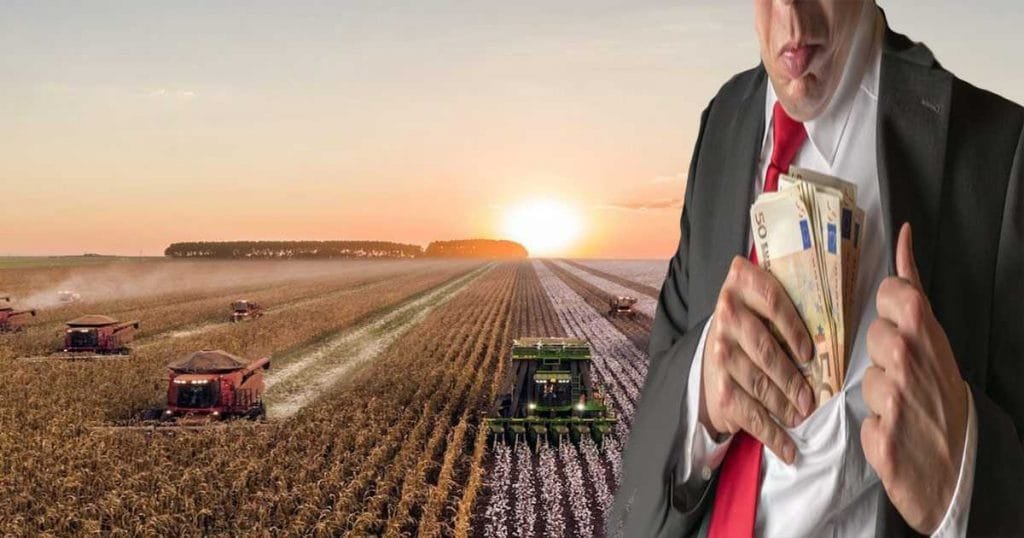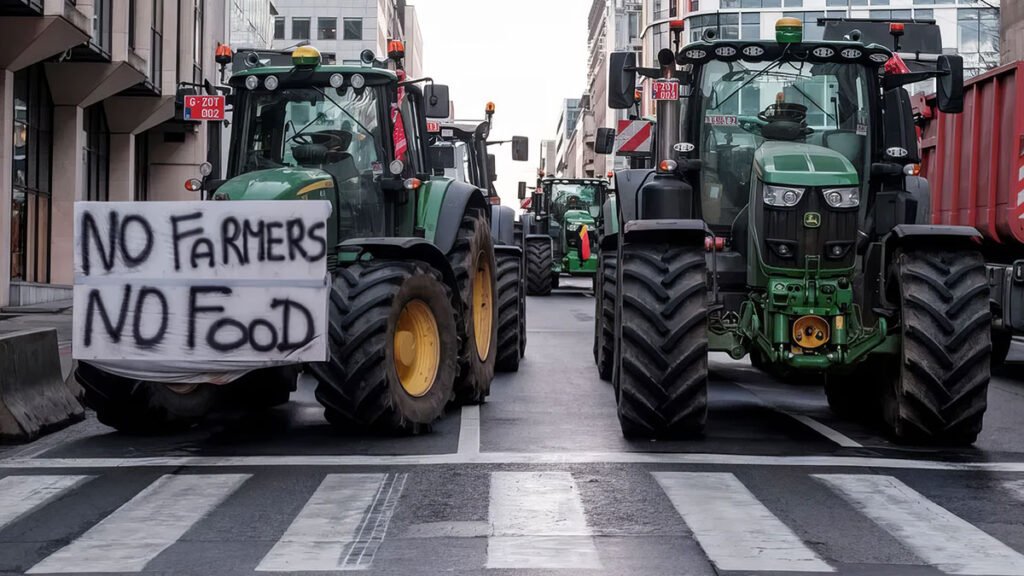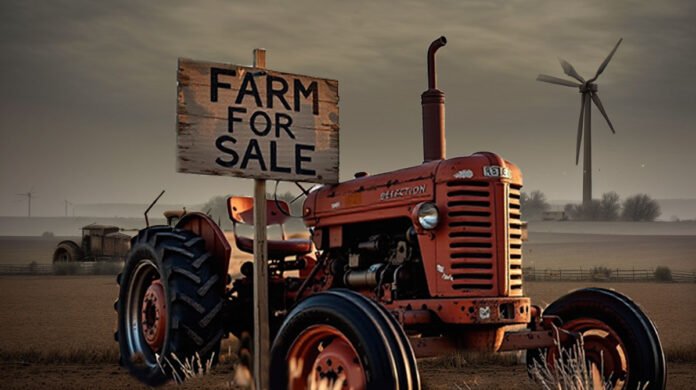How Labour’s Tax Policy Threatens Our Country Side and Food Sovereignty
The most profound changes in a nation’s character rarely announce themselves with dramatic flourish. They creep in through the quiet corridors of power, wrapped in bureaucratic paper and stamped with legislative seals. Today, we face such a moment as Labour’s inheritance tax proposal threatens to fundamentally reshape British agriculture – not through bold declaration, but through the subtle arithmetic of tax policy.
The Death of the Family Farm by a Thousand Cuts
What appears on paper as a simple tax adjustment – capping inheritance tax relief at £1 million – represents nothing less than an existential threat to British farming. As Karl Polanyi warned in “The Great Transformation,” when we reduce land to mere commodity, we risk destroying the very fabric of society.
Such is the nature of Labour’s latest inheritance tax proposal – a measure so precisely targeted at Britain’s agricultural heritage that it threatens to rewrite the future of our countryside more definitively than any natural disaster or economic crisis could achieve.
What appears on paper as a simple tax adjustment – capping inheritance tax relief at £1 million – represents nothing less than an existential threat to British farming. This isn’t hyperbole – it’s a reality now facing every small farm struggling to make ends meet.
Let’s be clear about what £1 million means in farming terms: it’s a distortion that can be easily misinterpreted by those who don’t look deeper. With agricultural land values hovering around £10,000 per acre, basic farm equipment costs soaring, and necessary infrastructure requirements, this cap barely covers the smallest viable farms. As Ben Sharples, an agricultural specialist at Michelmores, notes, this “relief” is woefully inadequate when considering modern farming realities.
The numbers paint a stark reality. Out of Britain’s 209,000 farms, approximately 70,000 stand to be affected by Labour’s proposed inheritance tax changes, according to the Country Land and Business Association. These aren’t sprawling estates owned by the wealthy; they are family farms, where hard work, not high returns, underpins Britain’s food security. They are asset-rich yet cash-poor, with land that has been passed down through generations—not a readily available fund that can be tapped to pay the taxman after the £1 million cap.
To illustrate, you won’t see many Welsh hill farmers jetting off to Dubai; a day out to Bangor might be more realistic. The average Welsh farm is 48 hectares, smaller than the 77 hectares typical in England and Scotland. For these farmers, their land is both their legacy and livelihood, yet for the taxman, it’s simply taxable property once it crosses that £1 million threshold.
Consider the financial reality: in 2021-2022, hill sheep farms in Wales had an average Farm Business Income (FBI) of £1,143 per hectare. With total costs—variable and fixed—amounting to £723 per hectare, their profit post-rent and finance dropped to just £377 per hectare. The figures are hardly more promising for other types of farms in Wales:
- Lowland sheep/beef farms saw an average income of £18,700 in 2022-2023.
- Dairy farms fared better, averaging £164,900, but carry higher operational costs.
- Other farm types averaged £47,800 in income.
- Across all types, the average farm income was £46,600 in 2022-2023.
In 2022-2023, farm costs rose by an average of 15%, driven primarily by higher expenses for feed, fertilizer, and fuel. With rising costs and shrinking margins, these families are barely managing to sustain their livelihoods. Yet under the new tax policy, it’s these same families who could be forced to sell their land to cover an inheritance tax bill, threatening not only their futures but also the stability of Britain’s food supply.
This isn’t merely about taxation – it’s about the systematic dismantling of generations of agricultural knowledge and tradition. When family farms are forced onto the market because their inheritors can’t afford punitive tax bills, we lose more than land – we lose the very foundation of our food sovereignty. Each farm will be snatched up and sold to corporate interests or property developers. This represents another thread snapped in the fabric of rural Britain, another step toward what Polanyi foresaw: a world where land becomes just another entry in an accountant’s ledger.
The False Promise of Labour’s Rural Vision

NFU President Tom Bradshaw said: “Farmers and growers have been left reeling from the changes announced in the budget which demonstrate a fundamental lack of understanding of how the British farming sector is shaped and managed. The current plans to change APR and BPR need to be overturned and fast.
“Farmers are rightly angry and concerned about their future and for the future of their family farms, having been reassured by ministers in the lead up to the budget that APR and BPR changes were not on the table.
It’s clear the government does not understand that family farms are not only small farms, and that just because a farm is an asset it doesn’t mean those who work it are wealthy.”
NFU President Tom Bradshaw
“The Treasury’s figures which claim this will only affect one in four British farms are misleading. The £1million cap to APR shows how little this government understands the sector. Very few viable farms would be worth under £1m, but lots of smallholdings and houses with a few acres let for grazing might be.
The asset value of genuine food-producing farms will be high, given the size they need to be to remain viable businesses; but that’s the value of the asset, it doesn’t reflect its profitability which is often, and increasingly so, very low.
“It’s clear the government does not understand that family farms are not only small farms, and that just because a farm is an asset it doesn’t mean those who work it are wealthy. I have said, every penny the Chancellor saves from this will come directly from the next generation having to break up their family farm. It simply mustn’t happen.
“MPs need to understand the consequences of these actions which is why we are mobilizing our members for a mass lobby in the coming weeks. British farmers will ask their MPs to look them in the eye and tell them whether they support this.
“There’s still time for the government to accept they’ve got this wrong, and my message to ministers is that they should do the right thing and reverse this awful Family Farm Tax.”
The NFU has republished a series of videos of Sir Keir Starmer’s speech at our 2023 Annual Conference to remind the Prime Minister of his commitments to British farming ahead of the Autumn Budget on 30 October.
The videos have been published on X (formerly Twitter), Instagram, Facebook, LinkedIn, and TikTok, and have been viewed more than 100,000 times in one week.
This follows repeated NFU calls for a multi-annual budget of £5.6 billion, as outlined in our letter to the Chancellor, and more than 2,000 members using our campaigning email tool to contact their MP.
NFU President Tom Bradshaw has also written a letter to Prime Minister Sir Keir Starmer, calling on him to stand by his commitments to British farmers and growers.
The Politics of Contradiction and Corporate Predation

Labour’s contradiction is stark. Prime Minister Starmer promised to support locally sourced food for the public sector and pledged to “make environment land management schemes work for farmers and nature.” Not for the first time his government’s actions tell a different story:
- A 76% reduction in basic payment schemes for 2025
- £600 million in “savings” carved from farming and flood budgets
- The dismantling of inheritance protections that kept farms in family hands
This isn’t policy coherence – it’s death by a thousand cuts.
The Labour’s environment secretary’s about-face is particularly galling. Steve Reed, promised no interference with agricultural tax protections. Keir Starmer pledged support for locally sourced food and environmental schemes to support farmers. Yet here we are, facing a policy that threatens to unravel the very fabric of British agriculture.
Labour’s promises ring hollow against the hammer blows of their actual policies. They paint a pastoral vision of locally-sourced food filling school cafeterias and hospital wards – pledging that 50% of public sector meals will come from nearby farms. Yet simultaneously, they craft tax policies that will force those very same local producers to sell their lands. The cognitive dissonance would be laughable if it weren’t so devastating.
If urban dwellers understand gentrification – the slow, methodical displacement of local communities by moneyed interests – then consider this rural transformation its agricultural cousin, but on steroids. While cities witness the gradual transformation of working-class neighbourhoods into luxury developments, our countryside faces a far more rapid and ruthless transformation.
This isn’t just about replacing corner shops with coffee chains – it’s about removing entire families from lands they’ve tended for generations, about erasing centuries of agricultural knowledge in the stroke of a tax assessor’s pen. This is gentrification on an industrial scale, orchestrated not by local developers but by global financial giants.
Consider the stark reality: You cannot source food locally when you’ve systematically dismantled local food production. You cannot enhance environmental stewardship while slashing the subsidies that make sustainable farming possible. These aren’t mere policy contradictions – they’re a blueprint for the corporate takeover of British agriculture.
Labour’s attempts to frame this as closing a “tax loophole” reveals either a stunning ignorance of rural economics or, more troublingly, a calculated deception. Every family farm forced onto the market becomes another opportunity for corporate vultures. BlackRock and The Vanguard Group aren’t waiting idly – they’re already orchestrating a massive land grab across Europe, with particular focus on Ukraine’s rich agricultural lands. We can see their strategy playing out in real time: flood European markets with industrially-produced food, undercut local producers, then buy up their lands when they can no longer compete.
The evidence is damning. Between 2005 and 2020, the European Union lost 37% of its farms. More telling still, 87% of these losses were small, family-owned operations – the very backbone of sustainable local food production. This isn’t some natural evolution of agriculture – it’s a calculated transfer of power from local communities to global corporations.
When these investment giants speak of “economic recovery packages” and “peace settlements,” they’re really talking about market dominance and control. Every acre lost to corporate farming is another thread cut in our tapestry of food sovereignty, another step toward a future where our dinner tables are at the mercy of shareholder profits.
This isn’t progress – it’s predation, dressed in the language of fiscal responsibility and market efficiency. And unless we recognise it for what it is, we risk losing not just our farms, but our very ability to feed ourselves.
It’s a Budget for Multinationals…
Another hit for UK farmers came with Defra’s confirmation that the nature-friendly farming budget is not protected. The budget reveals the government’s plan to squeeze £600 million in savings post-2025/26 from the farming and flood protection allocations. While the EU’s former £2.4 billion per year fund remains for now, it’s only guaranteed through next year, after which it will be “reviewed”—Treasury code for likely cuts. Although this sum is small change for the Treasury, cutting it means fewer protections for nature, pushing farmers to intensify production rather than maintain wild land that supports biodiversity.
Labour’s policies aren’t just mirroring Conservative cuts; they’re wielding a harsher axe against basic payment scheme funds—an EU-era payment system that’s being phased out and replaced by new “nature-friendly” payments. However, for 2025, Defra plans a drastic 76% reduction on the first £30,000 of these payments, with no funds for amounts over that threshold. For example, a £40,000 payment would be slashed down to just £7,200—a far sharper cut than the 50% reduction farmers faced this year.
These cuts represent a blow to an industry that operates on thin margins and plans years ahead. Many farmers, already grappling with economic uncertainty, now face further difficulty in sustaining their businesses and the environmental care their lands provide.
This isn’t just about farming – it’s about food sovereignty, national security, and the character of Britain itself. When Tom Bradshaw, NFU president, says “every penny the chancellor saves from this will come directly from the next generation having to break up their family farm,” he’s describing the dissolution of centuries of agricultural knowledge and tradition.

The consequences are predictable:
- Increased dependence on food imports
- Loss of local farming expertise
- Degradation of rural communities
- Reduced food security Corporate control of our food supply
The Way Forward We need:
- Immediate revision of the inheritance tax threshold
- Long-term agricultural policy supporting family farms
- Protection of agricultural land from corporate acquisition
- Integration of renewable energy that preserves food production
- Fair pricing mechanisms for agricultural products
- Support for next-generation farmers
The choice before us is clear: we can protect our agricultural heritage and food sovereignty, or we can surrender it to global capital. We can maintain a countryside of diverse family farms producing food sustainably, or we can watch it transform into a patchwork of corporate mega-farms and industrial installations.
As Polanyi understood, once we reduce land and labour to mere commodities, we unleash forces that destroy the very fabric of society. Labour’s inheritance tax policy isn’t just an attack on farmers – it’s an assault on Britain’s food security, rural heritage, and national resilience.
The question isn’t whether we can afford to protect family farms. The question is: can we afford not to?
Because when the last family farm is sold, when the last piece of agricultural knowledge is lost, when our food supply rests entirely in corporate hands – then we’ll understand the true cost of this “tax reform.” And by then, it will be too late.
The time to act is now.
I offer my support and solidarity to the protesting farmers…let’s not see another industry go down the Great British drain…sold out by another Tory government…
Support Independent Journalism Today
Our unwavering dedication is to provide you with unbiased news, diverse perspectives, and insightful opinions. We're on a mission to ensure that those in positions of power are held accountable for their actions, but we can't do it alone. Labour Heartlands is primarily funded by me, Paul Knaggs, and by the generous contributions of readers like you. Your donations keep us going and help us uphold the principles of independent journalism. Join us in our quest for truth, transparency, and accountability – donate today and be a part of our mission!
Like everyone else, we're facing challenges, and we need your help to stay online and continue providing crucial journalism. Every contribution, no matter how small, goes a long way in helping us thrive. By becoming one of our donors, you become a vital part of our mission to uncover the truth and uphold the values of democracy.
While we maintain our independence from political affiliations, we stand united against corruption, injustice, and the erosion of free speech, truth, and democracy. We believe in the power of accurate information in a democracy, and we consider facts non-negotiable.
Your support, no matter the amount, can make a significant impact. Together, we can make a difference and continue our journey toward a more informed and just society.
Thank you for supporting Labour Heartlands









